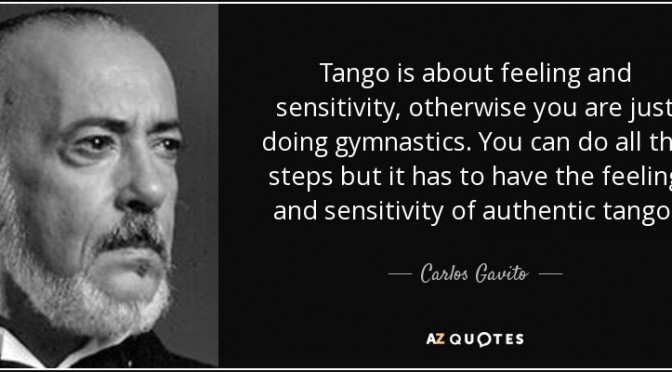There is a growing tendency – I think – for tango classes and workshops to feel like physically demanding exercises and for leaders in particular to loose the end goal.
That end goal for all of us is the Milonga. And her pleasure.
We are never going to be on stage. So that impressive tortuous repeating back secada based complex figure of the moment is perhaps something that we should only be working on as part of a creative exploratory analysis that unpicks spatial relationships and technique. In this way these complex figures and dynamics are indeed so useful – challenging and enjoyable.
But it’s just a class.
For her, when we dance together – if I turn my back on her and threaten to kick her – perhaps I have broken the moment? A cold shower comes to mind.
Surely we want to be brilliant social dancers. That is a goal I personally was so specific about when placed under pressure to define my objectives a couple of years ago.
Social dancers create something with this woman or man, to this music, in this space and time. It is most unlikely that your parter – or indeed yourself – could pass even the most basic of gymnastic qualifications
Personally I am spending so much more time on the music, the energy flows and finding pleasure through well danced figures that we can enjoy equally.
Dance. With her. To the music. It’s such fun.
Don’t kick her.


Thank you for your thoughts on workshops Nigel.
My thoughts on tango workshops are that they certainly have their place when one is at the beginning of ones tango experience. They are useful in that they allow one to make connections, get to learn and understand the basics of this very complex dance, allows for shared experiences and gives one a measure of ones progress and also gives one the opportunity to decide how far one wants to go in tango.
My difficulties, now with over five years of experience. are that most tango workshops are for me a torture. By torture I mean that most of them have far too mixed abilities, so that the classes are slowed down by over repetitiveness of “steps”. I’ve got it, but have to repeat the same movement, to ensure that the leader has “mastered” a particular move, without realising that his partner’s leg could just about fall off; for me this is really painful, saying it mildly.
Tango is a discipline, it needs structure and it needs techique first, just as in ballet the training is intense and then the dance flows. There are very few workshops that are strict about the abilities of participants, I feel this needs to be addressed.
Further very few workshops spend enough time on the core basics of tango movement. The only one so far in my years of learning tango, is Tangokills, where the emphasis is on individual work, technique, structure and repeat it again and again, so that it gets into the very dna of oneself.
Then the steps follow and the enjoyment of music, its musicality, its rhythm.
The tango workshop has its place if one wants to become a good social dancer, but or and, if ones goal is to be social only, , then the level of work ones does is reflected in the milonga. If one wants to be a brilliant social dancer, then the level of learning tango needs very intense core work, and maybe a different type of tango workshops and at the end of it, it depends how passionate one is about the dance and what one really wants to get out of it. (have I just repeated myself? oh well!)
I do now realise the value of listening to the “music” and recognising the different styles so as to appreciate and intrepet the music through the dance.
And not sure I agree with you about breaking the mood with the back sacada, as an example.
What for me breaks the mood is if the lead is not clear, the energy in the way I am held, and I am left floundering or trip over my feet.
Think I have said enough and think I will go and listen to some Biagi, to make me giggle.